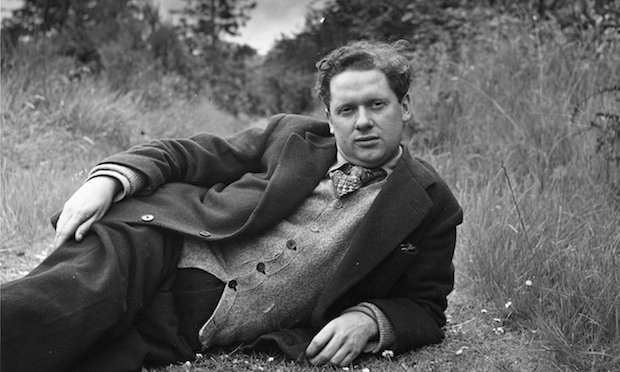My father came across Dylan Thomas in a Swansea pub in 1947. ‘Chap over there,’ said one of the regulars ‘is a poet.’ ‘What’s his name?’ asked my father. ‘No idea.’ That Thomas’s celebrity was rather patchy, even in his hometown just a few years before his death, illustrates how much his fame owes to the fans and memorialisers who have stoked the legend ever since. His centenary falls on 27th October.
He was morose, shy, florid-faced and hyper-sensitive. He described himself as having ‘the countenance of an excommunicated cherub’. His first poems, published in the 1930s, were greeted with cautious interest. Edith Sitwell championed him. So did Cyril Connolly. Sceptics found his imagery inscrutable or meaningless. Some called it surreal – a charge he detested. His greatest fault as a poet, his subordination of meaning to musicality, was also his greatest asset. By the late 1930s he was established as a reader and actor on BBC radio but his finances were chaotic. He ran through vast sums of money in pubs entertaining impromptu crowds. As a curtain-raiser he would scamper about on all fours, like a dog, and then trot outside snapping at the street furniture. He chipped several teeth biting lamp-posts. If the pub failed to warm to this performance he became despondent. ‘Let’s go somewhere else.’
He worked on films for the BBC propaganda unit during the war. Someone put together a satirical version of Leni Riefenstahl’s Triumph of the Will and commissioned Thomas to re-write Hitler’s speech to a rally.
Hitler: I grew into a discontented and neurotic child. My lungs were bad. My mother spoilt me. Consider my triumphant path to power.
[Crowd roars]
I took up art. I gave up art because I was incompetent. I became a bricklayer’s labourer…
Thomas was a gifted scrounger and a prolific thief. Asked by friends to look after their flat for a weekend he pawned a fur-coat and some silverware but he left the polish and the cloths out on the sideboard. He was invited to dinner by a professor of psychiatry and having arrived in a shambolic state he disappeared upstairs for a while. When he returned he was wearing the professor’s three-piece suit, shirt, tie and shoes. Nothing was said, at dinner or later, about this expropriation.
His ambitions outstripped his efforts. He and Sir William Walton agreed to collaborate on a tragic opera set in a dockside slum. Months later Walton asked about the libretto. ‘Finished,’ said Thomas and scribbled something on a postcard which he handed to the maestro.
‘With a sound like thunderclaps
The little mouse comes out, perhaps’
America made him. And finished him. His readings were a resounding success despite his obvious troubles with booze. It was even suggested that he overdid the bumbling drunk routine in order to magnify his achievement when he triumphed at the lectern. Always fearful that inspiration would desert him he produced a masterpiece at the close of his life, Under Milk Wood, whose lullaby rhythms and magical imagery have the stamp of immortality.
PS. The title is a schoolboy joke. Milkwood secretes latex from which prophylactics are made.







Comments